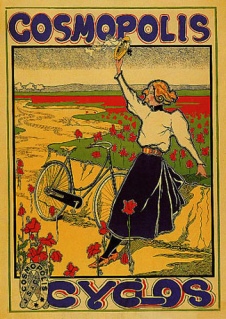“Books are the carriers of civilization. Without books, history is silent, literature dumb, science crippled, thought and speculation at a standstill. They are engines of change, windows on the world, lighthouses erected in the sea of time.”
— Barbara W. Tuchman, American historian and author, 1912-1989
 Have you ever been annoyed when a friend borrowed a book and didn’t return it?
Have you ever been annoyed when a friend borrowed a book and didn’t return it?
That must have been more than just an annoyance for medieval monks at a time when books were very rare objects, laboriously copied from earlier texts and lovingly preserved, as Barbara Tuchman said, as “humanity in print.”
Many of the tomes contained beautifully illuminated pages and maps of lands not yet fully explored, replete with sea monsters, fanciful creatures and, on at least one map, this legend for terra incognita: “Here be dragons.”
 I came upon the arcane subject of medieval book curses and bibliomania, an obsessive–compulsive disorder involving the collecting or hoarding of books, while reading a gem of a book by Miles Harvey, The Island of Lost Maps: A True Story of Cartographic Crime.
I came upon the arcane subject of medieval book curses and bibliomania, an obsessive–compulsive disorder involving the collecting or hoarding of books, while reading a gem of a book by Miles Harvey, The Island of Lost Maps: A True Story of Cartographic Crime.
 The book — besides delving into the history of books and maps, the people who made them and the libraries that house them — tells the story of Gilbert Joseph Bland Jr., a nondescript Florida antiques dealer who purloined millions of dollars worth of antique maps from some of North America’s most prestigious libraries and institutions before he was caught in 1995 at the Peabody Library in Baltimore.
The book — besides delving into the history of books and maps, the people who made them and the libraries that house them — tells the story of Gilbert Joseph Bland Jr., a nondescript Florida antiques dealer who purloined millions of dollars worth of antique maps from some of North America’s most prestigious libraries and institutions before he was caught in 1995 at the Peabody Library in Baltimore.
Harvey calls Bland “the Al Capone of cartography, the greatest American map thief in history.”
In his book, published in 2000, Harvey quotes this curse, purportedly from a Latin inscription at the library of the Monastery of San Pedro in Barcelona, Spain:
“For him that stealeth a Book from this Library, let it change into a serpent in his hand and rend him. Let him be struck with Palsy, and all his Members blasted. Let him languish in Pain crying aloud for Mercy and let there be no surcease to his Agony till he sink in Dissolution. Let Bookworms gnaw his Entrails in token of the Worm that dieth not, and when at last he goeth to his final Punishment, let the flames of Hell consume him for ever and aye.”
Pretty harsh stuff!
“The book curse followed an established basic structure of promising severe consequences, most often religious, to anyone who would take or alter a book,” Anderson wrote.
 “In the older societies, the wrath of gods such as Thoth, Ashur, and Belit was promised but in medieval Europe, it was removal from the sight of God that drove the most fear into the hearts of bibliomaniacs…
“In the older societies, the wrath of gods such as Thoth, Ashur, and Belit was promised but in medieval Europe, it was removal from the sight of God that drove the most fear into the hearts of bibliomaniacs…“Book curses used threats of several different types of punishment to invoke fear among those who would take or damage a book: bodily injury, damnation, excommunication, or anathema. The bodily injuries included hanging, illness, and painful death and usually called for more than one physical torment to befall the thief.”
Anderson, like Harvey, quotes that imprecation from “the monastery of San Pedro in Barcelona” as one of the more colorful of the book curses — and one which applies also to those who “borrow” books and don’t return them.
But, alas, that curse apparently is a hoax. I could find no evidence of the existence of the Monastery of San Pedro in Barcelona.
A bit of further research turned up the tale of Edmund Lester Pearson, a professional librarian for such institutions as the Library of Congress and the War Department, who from 1906 to 1920 wrote a weekly column, “The Librarian,” for the Boston Evening Transcript.
In a 1907 column, Pearson printed a paragraph supposedly from an old librarian’s almanac, wrote Wayne A. Wiegand in a 1979 book, The History of a Hoax: Edmund Lester Pearson, John Cotton Dana, and The Old Librarian’s Almanack.
 Response from colleagues and friends, Wiegand wrote, led Pearson to expand the column to a 34-page pamphlet, which was published in 1909 as “The Old Librarian’s Almanack.” The title page the almanack described it as “a very rare pamphlet first published in New Haven Connecticut in 1773 and now reprinted for the first time.”
Response from colleagues and friends, Wiegand wrote, led Pearson to expand the column to a 34-page pamphlet, which was published in 1909 as “The Old Librarian’s Almanack.” The title page the almanack described it as “a very rare pamphlet first published in New Haven Connecticut in 1773 and now reprinted for the first time.”The pamphlet, Wiegand wrote, was reviewed seriously by The New York Sun, The Nation, The New York Times and several other publications before the hoax became generally known. In 1927 the magazine Public Libraries called the hoax “a good piece of foolery, bright, clever, with the verisimilitude of authenticity.”
“Even today,” says Wikipedia’s entry on Pearson, “a humorous faux-medieval curse against book stealers from the pamphlet continues to be portrayed as real.”
 Whether the following oft-quoted curse is real or not, I don’t know. But I like it well enough to inscribe it onto the endpapers of some of my favorite books:
Whether the following oft-quoted curse is real or not, I don’t know. But I like it well enough to inscribe it onto the endpapers of some of my favorite books:Steal not this book, my worthy friend
For fear the gallows will be your end;
Up the ladder, and down the rope,
There you’ll hang until you choke;
Then I’ll come along and say –
“Where’s that book you stole away?”



























































Interesting post. My family always taught me to really respect books. We were never allowed to sit them down open, as it would wreck the spine. It was probably something to do with how much they cost, but also the essence of what they are, an important informational source.
I was raised an Army Brat in Germany. My family traveled extensively during the 11 years I lived in Europe. To this day I have a photgraph of the “Curse from San Pedro” framed upon my desk. It is the english translation, not the orginal latin, and was on display when we visited Barcelona in the late 1960’s.
My wife and I are avid readers, and books are lent out sparingly, often with a reference to the Curse 😀
Steve,
Thanks for taking a look at my blog. As you might surmise, I’m a bibliophile as well as a bicyclist. Cheers.
Jim